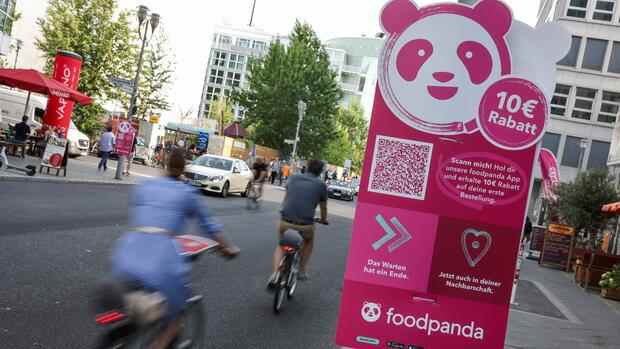But just five months after the subsidiary Foodpanda started operations in Berlin, this assessment is history again: Delivery Hero stopped deliveries of food in Germany on Wednesday with immediate effect. Only a so-called “innovation center” is to remain in Berlin.
The fierce competition for quick commerce, the delivery of groceries in less than half an hour, has found its first prominent victim. With the support of billions of dollars from investors, numerous start-ups have set up such services in major German cities – and so far have incurred high losses.
Delivery Hero justified the exit with precisely this tough competition. The “growing number of providers and the shortage of drivers” led to this decision, the company said.
Top jobs of the day
Find the best jobs now and
be notified by email.
“We are now confronted with a completely different reality than when we entered these markets and therefore have to pursue other growth opportunities with greater potential with a heavy heart,” admitted founder Östberg.
Investors seem relieved by the decision. By noon, the share price was more than six percent up. Apparently they have the hope that the Dax group is now investing its money in more profitable businesses.
Analysts and investors were skeptical early on
Even before the start in Germany, analysts were skeptical. “Investors are increasingly concerned that the investment case is changing,” said JP Morgan’s Marcus Diebel in July. “While the money-making regions have recently provided the cash flow for sustained high investments in Asia, some investors now fear that the European distributions will be called into question again and that overall spending will rise.”
The share had lost steadily since its high of 145 euros at the beginning of this year. In mid-November, the price was at times below 90 euros – although the company had meanwhile moved up to the Dax. Delivery Hero has not been in the black in a single financial year since it was founded in 2011.
What had also fueled the concerns: a good two years ago Delivery Hero had already withdrawn from Germany, at that time with its core business, the delivery of dishes from restaurants. Östberg had sold the business to its direct competitor Just Eat Takeaway.
In an interview with Handelsblatt in July last year, Östberg justified this with the fact that the company ultimately wanted to become profitable in the future. “And that’s difficult if you’re not one of the first to enter a market. It is not easy for the second and third to become profitable, ”said the Delivery Hero boss. But when he returned to Germany just a year later, this consideration apparently no longer played a role.
Gorillas and Flink have sparked hype about delivery services
The start-ups Gorillas and Flink triggered the hype about super-fast deliveries of food and everyday goods. They have set up small warehouses in the middle of the big cities and promise to bring the goods to the customer with bicycle couriers within ten minutes of placing the order.
This boom reached its peak so far with the entry of the US market leader Doordash in Germany. The delivery service attacked three times: It started under its own brand in Stuttgart, took a stake in Flink and finally took over the Swedish company Wolt, which had recently set up a delivery service in Germany, for seven billion euros.
Delivery Hero had also examined a takeover of Wolt, but withdrew because of the high price, as Östberg confirmed. In the market for express delivery services in Germany, the group is now only represented with a minority stake in gorillas.
Experts view Delivery Hero’s surprising renewed withdrawal with mixed feelings. “At least the concept was immature from the start and the operational implementation was disappointing,” says the independent e-commerce expert Udo Kießlich. The range with its 2000 articles was “neither attractive nor coherently structured”.
The German market was also very well occupied. “Doordash has so far acted more carefully than Delivery Hero with the takeover of Wolt and the stake in Flink,” says Kießlich, who helped set up the delivery service Allyouneed and the beverage delivery platform Kollex. Delivery Hero’s exit is of course a form of consolidation, but the volume of business was so small that it actually had no immediate consequences in the market.
Withdrawal from the Japanese market as well
Matthias Schu from the Lucerne University of Applied Sciences does not see the decision as a weakness, but rather as a “readjustment of one’s own portfolio with calculable risk”. He emphasizes: “The millions that would be burned in Germany to gain market share can be used with a much greater impact in other countries.”
Delivery Hero started late on the market and was therefore confronted with an oversupply in its focus cities, says the expert. Now the company can focus more on markets in which the business model works better due to lower wage structures and generates faster profit, for example Eastern Europe or Asia and South America.
But even there, Delivery Hero is now reaching its limits. The company announced on Wednesday that it intends to sell its Japanese business, which it had started with high hopes. There, too, Delivery Hero draws the conclusion that the competition is apparently too strong after just over a year. The sales process should start in the first quarter of next year.
More: Delivery Hero boss Östberg: “I don’t think investors are drawing parallels with Wirecard”
